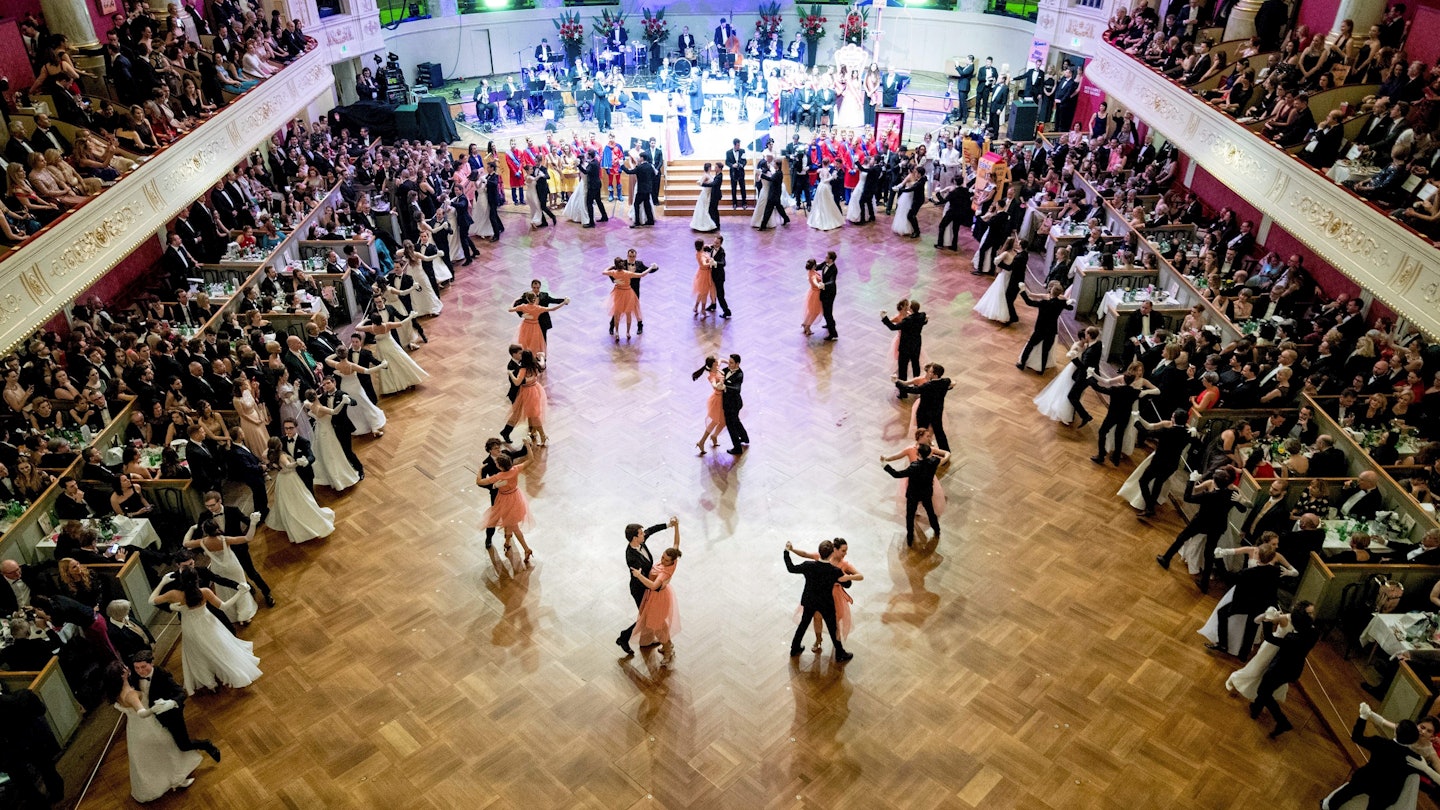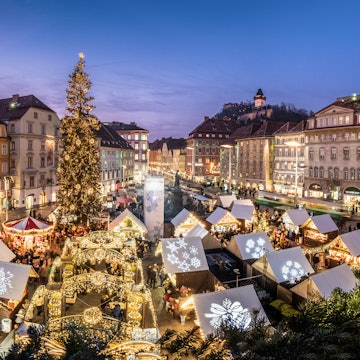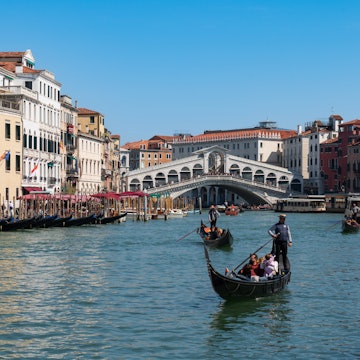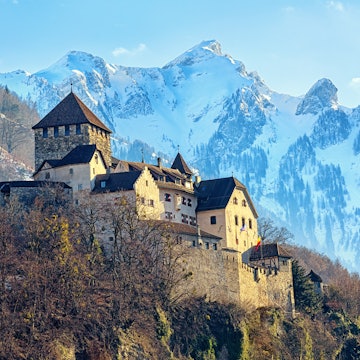

The Bonbon Ball takes place at the art nouveau-style Vienna Konzerthaus © JOE KLAMAR / Getty Images
Vienna’s famous winter ball season is here! Eagerly awaited by thousands of Viennese and a growing number of visitors, these ballroom dancing events have shaped Vienna’s image in the same way as Sacher Torte and the Great Ferris Wheel. While the ball season officially started on 11 November, the most popular balls take place from New Year’s Eve and run through until Shrove Tuesday (February 25th). Here's Lonely Planet's guide for first-time visitors to the winter ball scene.

Why you should go
Whether you hold a gold-star dance certificate or can barely rotate around your own axis, there are plenty of reasons to visit a Vienna winter ball. These events are part of Austria's cultural heritage, just like visiting a traditional coffeehouse, and they give history buffs the change to explore notable buildings in a novel way. Music fans will enjoy a menu of live performances, from classical music to samba and even disco tunes. A classic Wiener Ball is a prime occasion for lovers of glam and glitz to properly adorn themselves.
Historic tradition
For at least six generations, the local upper – and subsequently middle – classes, have embraced their Vienna winter balls. Whereas the Imperial ball tradition goes back to the 17th century and Empress Maria Theresa, it was Prince Metternich who ignited the ball fever on a broader level during the Congress of Vienna in 1814–15.
The different types of ball
Although there is no official classification of balls in Vienna, grouping the approximately 400 events helps visitors decide which ball is right for them. Here is a very brief selection of some of the balls available.
Traditional balls
Since traditions constitute a cherished part of a Viennese ball, traditional balls such as the Wiener Philharmonikerball, the Vienna Opera Ball, and the Ball of the Coffee Brewers are blockbuster events. Taking place at the most illustrious historic venues, they promise a festive opening ceremony, a formal dress code and ample opportunities to practice Viennese waltz. Many balls derive their names from the local guilds and professional associations that organise them, such as the Ball of the Legal Professionals, the Confectioners’ Ball and the Medical Doctors’ Ball.
Masked and themed balls
In addition to the standard programme, some traditional balls offer some extra fun. For example, the Rudolfina Redoute is a masked ball. Ladies are required to wear masks until they take them off during the ritual demasking quadrille dance at midnight. In past years, a few traditional balls have introduced themed programmes – the Ball of the Legal Professionals's will be celebrating "Golden Twenties" at its event in February.
Balls with gala dinners
A few traditional balls offer gala dinners in the early evenings, mostly before the opening ceremonies take place. Among the most famous is the New Year's Eve Gala at the Vienna City Hall, and Hofburg Silvesterball. Because most traditional balls are very popular locally, travellers have often found it challenging to secure tickets. A few balls such as the Johann Strauss Ball, Palais Auersperg Silvesterball and also Hofburg Silvesterball have therefore focused their marketing on tourists.
Folkloric balls
If you’d like to experience Austrian folklore in a festive Dirndl (women's traditional dress) or folkloric suit, attend the Kathreintanz, Steirerball, Jägerball, Tirolerball, or Ball der Vorarlberger. Most of these balls celebrate one of Austria’s regions, and whilst they are open to everyone, they are particularly popular with people who are originally from that region.
Local district and school balls
A surefire way to explore Vienna winter balls beyond imperial glamour is to venture away from the city centre into the local neighbourhoods. Learn about the discrete charm of Hietzing’s community, or Christian Rochusball in the central Landstrasse neighbourhood.
LGBT+ and contemporary balls
Just the like the Rainbow Parade, Vienna’s LGBT community celebrates in style at the Wiener Regenbogenball. Other more contemporary balls embrace different cultures and topics, such as the Chinese New Year Ball, the Refugees’ Ball (charity ball for refugees), and the Vegan Ball.

Key ball venues
In principle, the longer the specific ball’s tradition and social status, the more glamorous the venue. Take the Vienna Opera Ball, for example, the only one happening at Wiener Staatsoper. Among the most sought-after venues are balls at Hofburg Imperial Palace, where the Association of Vienna’s Coffee Brewers host a ball each year. Other glitzy venues include Musikverein, home of the Vienna Philharmonic Ball and venue of the popular Techniker Cercle, and art nouveau-style Wiener Konzerthaus, where the Bonbonball takes place. Another enviable spot is the Vienna City Hall with its neogothic ballroom and arcades, which hosts a range of balls including the New Year’s Eve Gala.

Ball etiquette
Even before attending a ball, the specific etiquette requires a few choices, such as what to wear and which ticket to buy. Unless you are a 16-year-old debutante, white ball gowns are a no-no. For women, most Vienna winter balls require long evening dresses, whereas the requirements for gentlemen – tuxedo, tail coat or just black suit, tie or no tie – vary.
During a ball you can move freely between the different dance halls. Sitting down at a table is only allowed if you have bought an additional table seat ticket. Be prepared to share a table with up to 10 other guests.
When it comes to dancing, dancers stay among their social groups, usually only dancing with people they already know. However, if the master of ceremony announces "Damenwahl" (ladies' choice) the ladies can choose their dance partners freely. In recent years, the solution for single ladies or those with dance-shy partners have been taxi dancers, who can be hired at most key balls.
Make it happen
For most traditional balls in January and February, ticket sales start in the previous autumn (the Vienna Opera Ball is an exception, with ticket sales starting almost 12 months ahead of the event, and notoriously selling out very quickly). Seated tickets tend to be snapped up first, so visitors may have more luck with flaneur tickets, which are entrance tickets without seats. Buy tickets online directly from the balls’ websites. Certain hotels such as Imperial, Sacher and Altstadt can arrange ball tickets for their customers.
Ball gowns, tuxedos and tailcoats can be bought in Vienna at Flossmann, or rented from Vondru. Ladies may also want to book a hairdresser appointment in advance.
You might also like:
Austria's most magical Christmas markets
Wien uncorked: how to enjoy Vienna responsibly















